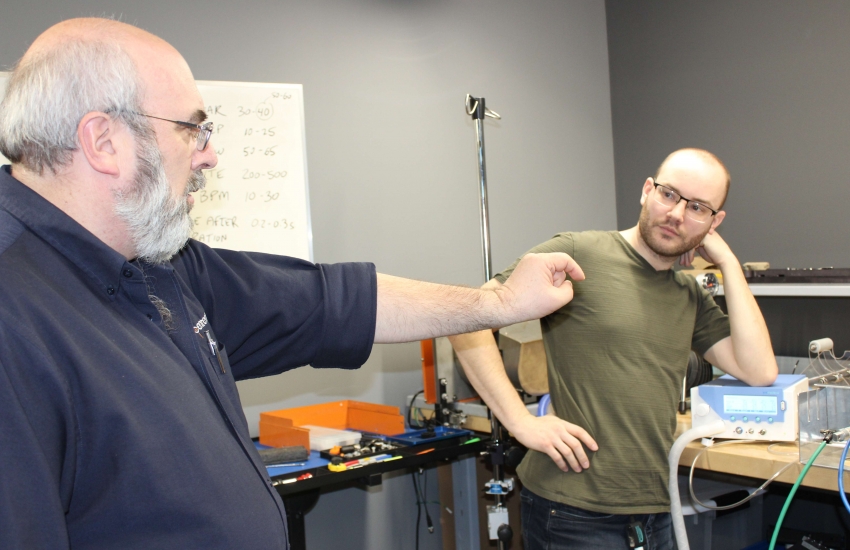A “simple little device” to help with breathing awaits Health Canada approval, following a collaboration between Automation Solutions Provider, CenterLine (Windsor) Limited and St. Clair College, in response to a potential shortage of ventilators during the COVID-19 crisis.
The device, designed and tested at CenterLine facilities, will automatically inflate and deflate a manual ventilator bag, taking over what a pair of human hands would normally do.
The Product Development Team at CenterLine created the concept that “is nothing complicated, from a mechanical or engineering perspective,” according to Larry Koscielski, Vice President of Process & Technology Development at CenterLine. “It’s a simple little device. But now, when you start to understand all the little things that it has to do, and all the thought that’s gone into it…Like everything in life, breathing is incredibly more complex than we understood.”
Faculty from the College’s programs in Respiratory Therapy and BioMedical Engineering Technology, who understand how a person breathes, collaborated with the engineers at CenterLine, who are more accustomed to working with automotive parts than medical parts.
“Every interaction brought another level of understanding and opportunity to improve or solve another problem,” Koscielski said. “They’re taking something that for them is intuitively tactile. They get feedback just because they can feel it in their fingers and we’re basically taking that away from them in the mechanical squeezebox.”
The project kicked off on March 21, when a group of people responded to a call to action from the Windsor Essex Ventilator Solutions Team. Representatives from the Windsor-Essex manufacturing industry, St. Clair College and Windsor Regional Hospital met and brainstormed ideas on what could be done and who could do it.
Within one day of that meeting, a cross-functional team at CenterLine had developed prints that were released for manufacturing. By Monday, March 23, “we had all the parts assembled into a working prototype,” Koscielski said. “From the very first functional prototype, we have produced a total of 11 systems leading up to the final product.”
The method used to temporarily ventilate a critically ill patient is a "manual resuscitator" often referred to as a BVM (Bag-Valve-Mask). To operate a BVM, both hands of the Respiratory Therapist or other healthcare provider, are kept busy, while the bag is manually squeezed by hand to deliver a breath to a patient. In the unfortunate event of a ventilator shortage, it is not practical for healthcare providers to continue this type of ventilation over a long period of time.
The goal of the team from CenterLine and St. Clair was to rapidly develop a device which could be used to actuate BVMs in a crisis situation such as the Covid-19 pandemic that we are currently experiencing. As an automation company, CenterLine is accustomed to developing automated systems that can replace repetitive actions normally provided by a person. In this case the task was to replace the human hand which normally compresses the BVM with an automated device.
The result of the collaboration was a hands-free BVM actuator system, which consists of two simple opposing pneumatic cylinders, extending and retracting to compress a bag. The amount that the bag is squeezed is important since it affects the amount of air delivered to a patient, so simple mechanical adjustments were developed to change the amount of bag squeeze.
The rate of breath delivery is also very important. To achieve a consistent rate, an electronic control system was designed to regulate the number of breaths delivered per minute. Finally, the output pressures delivered by the bag are also important, ideally the high-and-low pressure limits must be maintained within very specific ranges. A pressure sensor was added to the control system to monitor these levels, including alarms to alert medical staff of any deviations.
The medical experts from St. Clair College provided extensive real-world guidance on the requirements for an automated actuator system that could potentially be used with patients in a medical environment.
Luckily, the immediate need for these lifesaving devices has subsided, and Health Canada’s approval may never come. But it got Koscielski thinking about something he heard somewhere else during this crisis.
“We may never know if we over reacted, but if we don’t do enough, we sure will know it,” Koscielski said. “All along, the very best outcome we could have hoped for is that the community would never need them. As of right now it would seem that this is going to be the case.”
Despite this, the solution to a potential shortage of ventilators is a lesson in perseverance, innovation and collaboration.
Koscielski said St. Clair “lent us equipment and made themselves available, often with little notice to help answer questions and guide us. Every interaction brought another level of understanding and opportunity to improve or solve another problem.”
St. Clair was also able to leverage support from Windsor Regional Hospital and staff from the hospital visited CenterLine, providing insights on the hospital’s needs.
All of this culminated in a letter of support being sent to Health Canada that was co-signed by Windsor Regional Hospital CEO David Musyj and its Chief of Staff, Dr Wassim Saad. Another supporting letter was sent by Windsor Mayor Drew Dilkens.
“The people at CenterLine care deeply about the community,” Koscielski said. “All parts of the organization came together to make this happen and all of us at CenterLine are proud of the work that was done for the community.”
